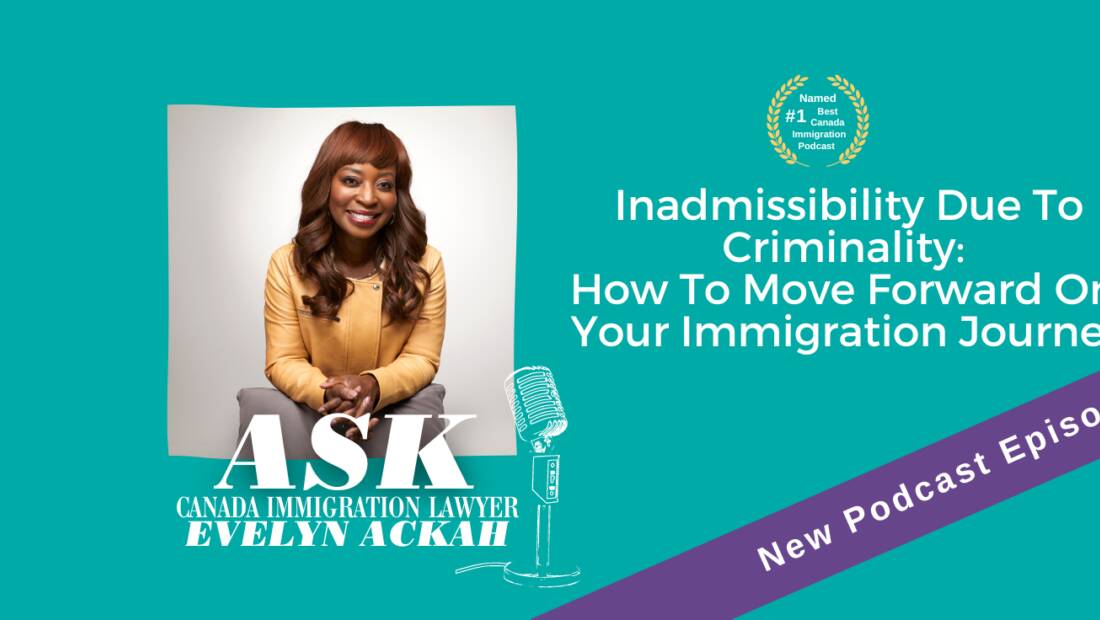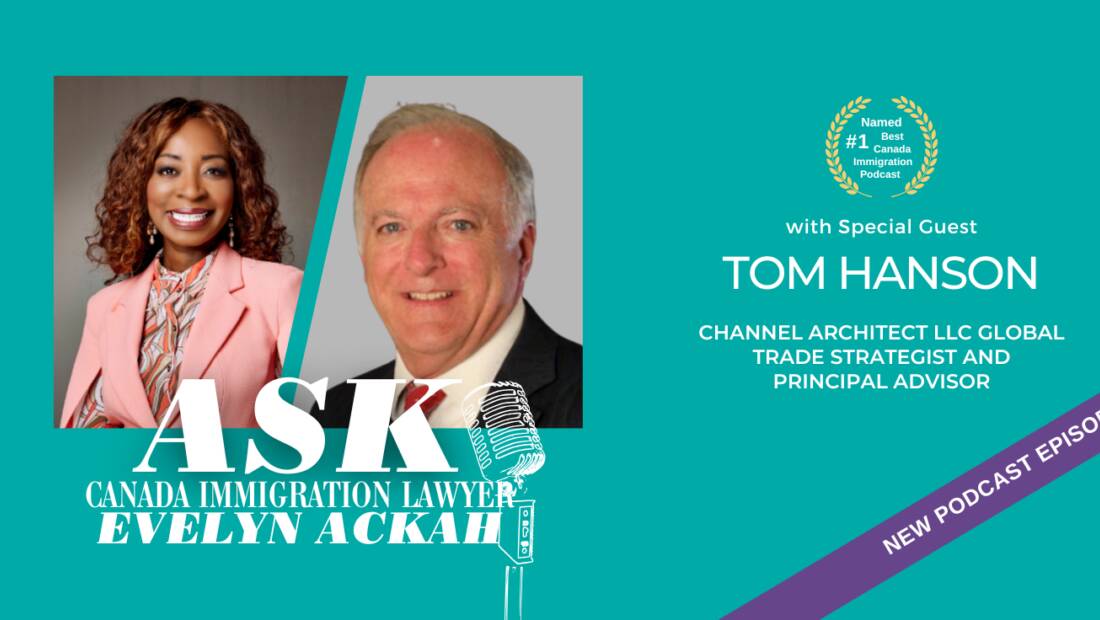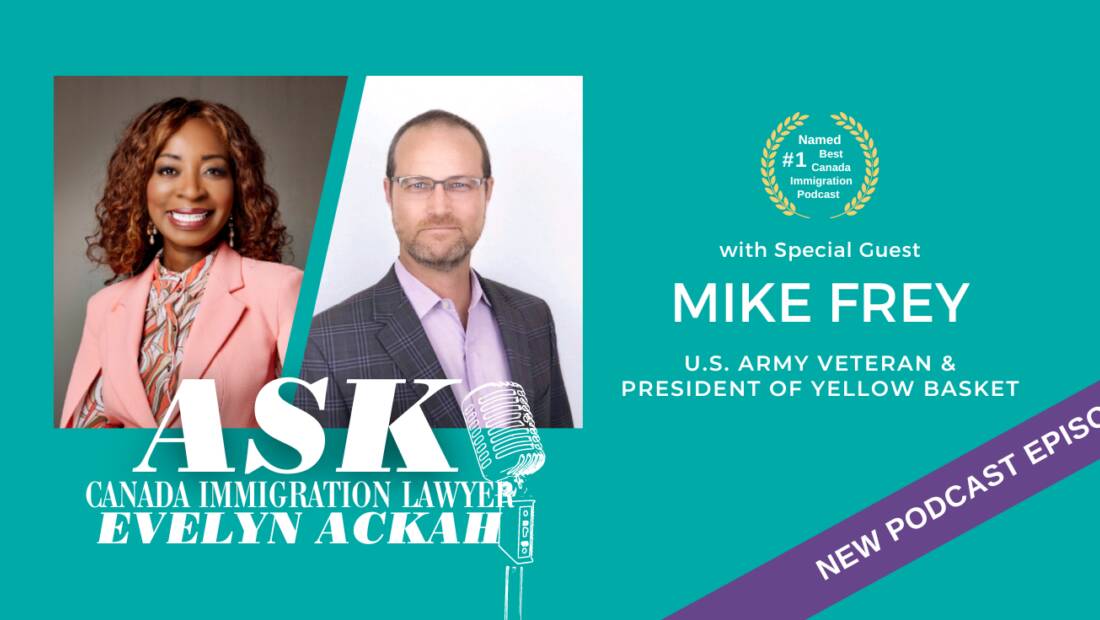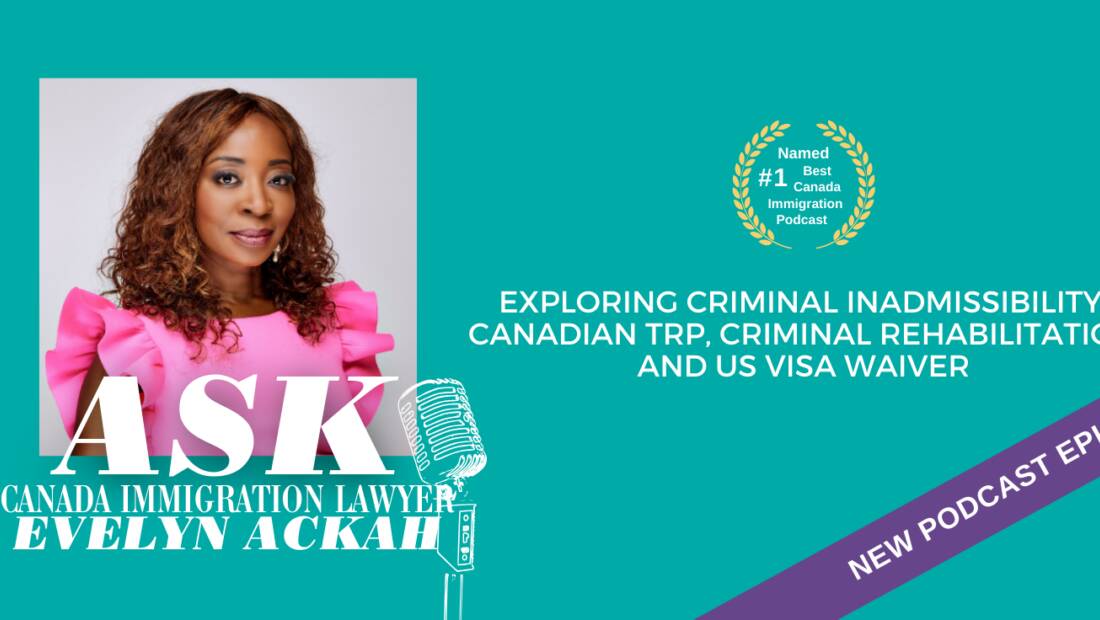Or listen on your favourite podcast app
Calgary immigration lawyer Evelyn Ackah provides a detailed explanation of how an individual with a criminal incident in their past can qualify for a TRP or visa waiver to enter Canada or the United States. Someone with pending charges, not a conviction, may be denied entry, and many individuals who have successfully crossed the border multiple times are finding that an older conviction is now turning up on electronic databases and preventing them from entering the country.
Criminal inadmissibility and inadmissibility waivers are an area of law often called crimmigration. Immigration lawyers can help people with a criminal history - even 20 years in their past - qualify to legally enter the country by applying for a determination of individual rehabilitation. Criminal admissibility issues can impact business people travelling for working, individuals who want to vacation in Canada or the U.S. and families who are trying to reunite. In Canada, an individual may qualify for a Temporary Resident Permit (TRP) to enter the country for a period of time while to enter the United States a visa waiver is required.
BOOK YOUR FREE CASE EVALUATION
On the podcast, Evelyn Ackah discusses how someone with a criminal history can legally cross the border into Canada or the United States, and how consulting with a professional lawyer can help navigate the complexities of inadmissibility and facilitate seamless border crossings.
- In Canada, individuals with previous criminal history, even from many years ago, may face challenges entering the country.
- How Ackah Business Immigration Law can help determine eligibility for a temporary resident permit (TRP) that grants special permission to enter Canada for work, pleasure, or business.
- Americans who are usually exempt from formal visa processes may require a TRP if they are deemed inadmissible due to criminality.
- Factors affecting TRP approval include the recency of the criminal history and the justification for entering Canada.
- Individuals with a significant history (10-15 years or older) can also apply for criminal rehabilitation to permanently remove their inadmissibility.
- Ackah Law recommends considering both a TRP and criminal rehabilitation for cases involving older convictions.
- Immigration may refuse TRP or criminal rehabilitation applications if the volume of charges and convictions is high or if rehabilitation is not evident.
- In the United States, Canadians with criminal convictions are inadmissible, and a Canadian pardon does not remove this inadmissibility.
- Legal counsel is recommended to apply for a Visa waiver, which can take four to six months for approval.
- Once approved, the Visa waiver allows entry into the United States for a period of one to five years, depending on US Immigration's discretion.
- Unlike Canada, the Visa waiver requirement in the US does not go away and needs to be repeated for each entry.
- Pending charges can also affect entry into the US, even without convictions.

About Evelyn Ackah
Evelyn Ackah is the Founder and Managing Lawyer at Ackah Business Immigration Law. With offices in Calgary, Toronto and Vancouver, we work with individuals and business owners from all over the world who want to cross borders seamlessly. For more information on immigration to Canada or the United States, Ask Evelyn Ackah at Ackah Business Immigration Law today at (403) 452‑9515 or email Evelyn directly at contact@ackahlaw.com.
The Ask Canada Immigration Lawyer Evelyn Ackah podcast by Calgary Immigration Lawyer Evelyn Ackah was named #1 Best Canada Immigration Podcast in 2022 by Feedspot.
BOOK YOUR FREE CASE EVALUATION
Transcript
Evelyn Ackah:
Good day, everyone. It's Evelyn Ackah from Ackah Business Immigration Law. Thank you so much for joining me on this LinkedIn Live as well as on our Ackah Law Podcast, as Canada Immigration Lawyer, Evelyn Ackah. Today, I'm going to be talking about inadmissibility due to criminality. It is really a regular part of the immigration world that I'm in. We sometimes call it crimmigration. But basically, it is when immigration is impacted by previous criminal history, and what to do, and what we can do to support you with this matter.
So, let's talk first about Canada. If you are coming from, let's say, the United States, and you might have a DUI or a couple of charges, and convictions from 20 years ago, you'll notice more, and more that there'll be more challenges with people to come and getting into Canada as a result of the problems that they might have had in the past. This is very common. We've got executives, and senior people who sometimes encounter this issue where they are deemed to be inadmissible, due to the fact that they're not able to enter Canada because of criminality.
So, if you find yourself in that situation or if you have an employee in that situation, something we can do to assist you is we can help determine if you're eligible to get a temporary resident permit. That temporary resident permit is what allows you to be able to get special permission, so that you can enter Canada, and be permitted to come in for work, or for pleasure, or for business. So, what happens is you can't just come in, even though Americans can usually travel to Canada without a formal Visa process at the consulate. If the border officials or the airport officials deem that you are inadmissible, because of previous history, you will have no option but to try for a temporary resident permit. And we usually recommend engaging legal counsel. It can be quite complicated. It could be a factor of how long ago the criminality occurred. If it's very recent, it's going to be harder to get that temporary resident permit permission to enter Canada.
What Canada Immigration cares about is confirming that you're not going to be a risk to Canadians by virtue of them letting you into Canada. Obviously, the longer the criminality, 20 years ago, 30 years ago, the less likely you'll be negatively impacted, and refused a TRP, but you may still need to apply for that temporary resident permit first at the Canadian Consulate. Get that permission. There has to be real justification as to why you're coming into Canada, why you need to come in. Is it compelling? Is it for work or is it just for a wedding? They're all differences there. And at the consulate, they're making that determination on behalf of the Minister of Immigration as to whether or not to let you come to Canada.
If it's something where you have a significant history that's more than 10, 15 years old, you can also apply at the same time for something called criminal rehabilitation under the immigration regulations. So, the temporary resident permit is for temporary travel. You might get one year on a TRP, but it doesn't actually remove the fact that you are still considered inadmissible, and you'll have to continue to do the temporary resident permit every year, every two years. If you qualify, based on the seriousness of the conviction and charges, or the length of time has passed, you may qualify to apply for a full criminal rehabilitation for immigration purposes. And if you are eligible, then that means it might take a year to a year and a half, but that means it takes away all inadmissibility, so that you are no longer deemed a risk to Canada, because your convictions were so long ago.
So, we always recommend when we do initial consultations with clients, and we see that something has occurred 10, 15, 12 years ago, they may want to consider doing both the temporary resident permit, and the full criminal rehabilitation, so that they can get rid of this once and for all on their records. And it makes traveling to Canada so much easier, once you get approved. Occasionally, Immigration will refuse the temporary resident permit or the criminal rehabilitation, if they deem that the volume of charges and convictions are so high, and that you may appear to be a serial criminal individual, and getting charged and convicted that you haven't actually shown true rehabilitation. In that case, they may refuse the criminal rehabilitation application. So, that is the process for Canadian immigration in terms of how to enter due to criminality. And obviously, you can contact us to learn more, because it is complicated.
I'd like to then talk about the process for going into the United States with criminality, because that process is a little different. So, for instance, for Canadians who might have conviction for assault, or for robbery, or something like that, you are deemed inadmissible into the United States, and a pardon does not take that inadmissibility away. So, we always say this to people, "Getting a Canadian pardon doesn't make it go away." And so, you definitely want to consider whether or not you have gotten legal counsel, because we recommend that you would need to apply for a Visa waiver. And with the work of a professional such as myself at Ackah Business Immigration Law, that process could take four to six months to get the approval. But once you get the Visa waiver approval, US Immigration can approve it for one year up to five years. We always ask for five. However, it is truly up to US Immigration, whether they want to give you that. If they think there might be any risk at all with you in the United States, if there's any concerns.
So, the one thing that's very different about the United States when it comes to Visa waiver, if you are looking for cross-border travel, let's say for business or for pleasure, is the Visa waiver requirement never goes away. Unlike in Canada, where after you get your full criminal rehabilitation it goes away, in the United States, you will need a Visa waiver forever. And that means it's repeat, repeat, repeat. And that feels like a bit of a cash grab for US Immigration, but that is their way of dealing with inadmissibility. So, if you think you need to travel for business, or for pleasure, or for work, or even to get a US work permit, if you have criminality, that will definitely impact your ability to get that access.
You also will have limited ability to enter the US if you have what is pending charges. We've had cases where people have just received a charge, and they haven't even been convicted, and they tried to travel the US for work, they're already banned from that, because they have something in process. So, please, before you try to do this on your own, reach out to a professional, a lawyer that can help you deal with the inadmissibility, so that you can cross the border as seamlessly as possible. I hope this has been helpful. If you'd like to learn more, please contact us at the above phone number and email address. Thanks so much for joining us on this LinkedIn Live, and our Ask Canada immigration lawyer, Evelyn Ackah Podcast. Take care, bye-bye.












